Potřebujeme váš souhlas k využití jednotlivých dat, aby se vám mimo jiné mohly ukazovat informace týkající se vašich zájmů. Souhlas udělíte kliknutím na tlačítko „OK“.
ASTM E1364-95(2012)
Standard Test Method for Measuring Road Roughness by Static Level Method
Automaticky přeložený název:
Standardní zkušební metoda pro měření nerovnost na vozovce o statickou metodou Level
NORMA vydána dne 1.6.2012
Informace o normě:
Označení normy: ASTM E1364-95(2012)
Poznámka: NEPLATNÁ
Datum vydání normy: 1.6.2012
Kód zboží: NS-41507
Počet stran: 6
Přibližná hmotnost: 18 g (0.04 liber)
Země: Americká technická norma
Kategorie: Technické normy ASTM
Kategorie - podobné normy:
Anotace textu normy ASTM E1364-95(2012) :
Keywords:
ICS Number Code 93.080.20 (Road construction materials)
Doplňující informace
| Significance and Use | |||||||||||||||||||||||
|
This test method provides a means for obtaining a standard roughness index using generic equipment. This particular test method is simple but labor-intensive, and is most appropriate for establishing reference roughness levels for a limited number of test sites. Test sites whose roughness is measured with this test method can be used to calibrate response-type measuring systems (see Test Method E1082). Such sites can also be used to verify proper operation of other profile measuring systems, and to establish accuracy levels for other profile measuring systems (see Test Method E950). |
|||||||||||||||||||||||
| 1. Scope | |||||||||||||||||||||||
|
1.1 This test method covers the measurement of a longitudinal profile of a travelled surface using a static level for the purpose of obtaining a road roughness index. This test method is suitable for all surface types that are travelled by conventional ground vehicles, including paved and unpaved roads. 1.2 This test method is labor-intensive with respect to other means for measuring longitudinal profile, and is used mainly for (1) validating other profile-measuring methods and (2) calibrating response-type roughness-measuring systems. Note 1—When measuring road roughness with a static level for the purposes of validating other profile-measuring methods or calibrating response-type roughness-measuring systems, the static level measurement process should be evaluated to ensure the measurements are within the resolution required in Table 1. It is recommended that several locations be marked at various distances from the level and these locations be measured in sequence several times to establish if the readings stay within the resolution required. Wind, distance between the rod and the level, surface texture, and positioning of the rod all have significant impact on the repeatability of the elevation measurements. Any variation from the true elevations will primarily affect the bias as explained in 10.2. To determine the effect of random variations, random variations can be added to an existing profile and the IRI recalculated to determine the impact of the variations. 1.3 This test method describes the computation required for one particular type of roughness index, the vehicle simulation used in the International Roughness Index (IRI). Additionally, the profile obtained with this test method can be processed to obtain other roughness measures. 1.4 This test method includes two levels of accuracy that can be chosen according to need. The more accurate, designated as Class 1, reduces the measurement error of the roughness index to less than 2 % of the true value of the index. The second, designated as Class 2, involves errors less than 5 %. 1.5 The values stated in inch-pound units are to be regarded as standard. The values given in parentheses are mathematical conversions to SI units that are provided for information only and are not considered standard. 1.6 This standard does not purport to address all of the safety concerns, if any, associated with its use. It is the responsibility of the user of this standard to establish appropriate safety and health practices and determine the applicability of regulatory limitations prior to use. TABLE 1 Resolution Requirements
|
|||||||||||||||||||||||
| 2. Referenced Documents | |||||||||||||||||||||||
|
|||||||||||||||||||||||
Podobné normy:
Historická
1.1.2008
Historická
1.12.2009
Historická
1.6.2012
Historická
1.12.2010
Historická
1.6.2009
Historická
1.6.2013
Doporučujeme:
Aktualizace technických norem
Chcete mít jistotu, že používáte pouze platné technické normy?
Nabízíme Vám řešení, které Vám zajistí měsíční přehled o aktuálnosti norem, které používáte.
Chcete vědět více informací? Podívejte se na tuto stránku.


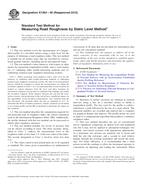
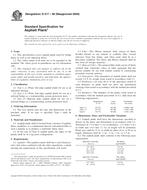 ASTM D517-98(2008)..
ASTM D517-98(2008)..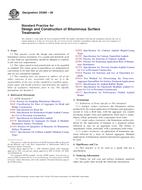 ASTM D5360-09
ASTM D5360-09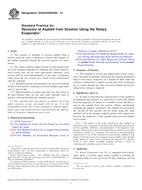 ASTM D5404/D5404M-12..
ASTM D5404/D5404M-12..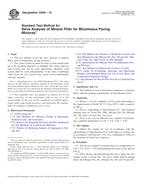 ASTM D546-10
ASTM D546-10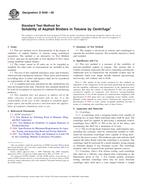 ASTM D5546-09
ASTM D5546-09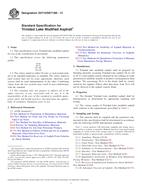 ASTM D5710/D5710M-13..
ASTM D5710/D5710M-13..
 Cookies
Cookies
